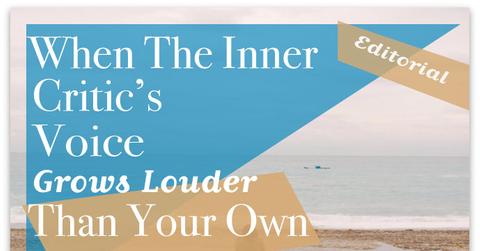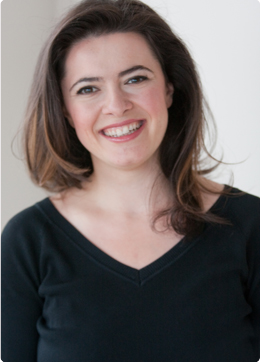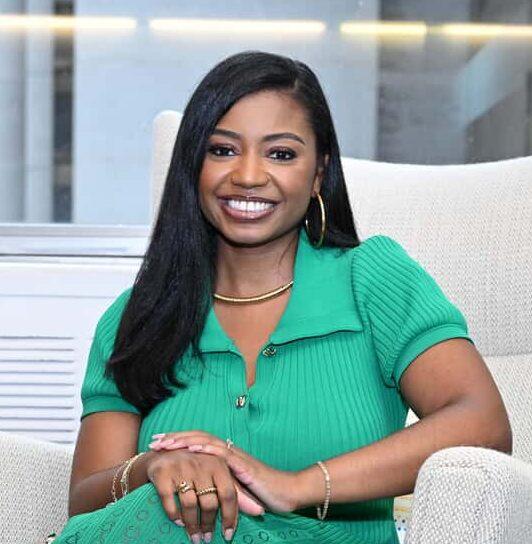Editorial: When The Inner Critic’s Voice Grows Louder Than Your Own

When First Lady Michelle Obama visited a group of girls in London, she told them “Don’t be afraid to fail. Don’t be afraid to take risks. Learn to use your voice now.”

But when we are girls, our voices are naturally strong and bold. Speak to any young girl today, she is bold and confident in what she knows about herself. Think back to yourself as a girl. When do you remember your voice being the strongest? Take a second to reflect on that. When did you first feel the need to validate something you thought with a source, or with some type of external co-sign to prove the relevancy of what you believed to be true?
If you can remember that moment of questioning your voice, you were more than likely sitting in a classroom in front of an open text book. The teacher just asked a question to the class, and you knew the answer right away. But before you raised your hand, you skimmed the page in front of you just to make sure the answer was written on the page the same way it existed in your mind.
This pause, this second of hesitation before revealing what you know to be true probably started in elementary school, and grew slowly as you moved from junior high, to high school, to college and worked to excel to the top of your class. The hesitation, the feeling of a need for some sort of external validation for our thoughts, for our voice, is very subtle in our early years but ultimately in college it becomes amplified.
Leadership expert and life coach, Tara Sophia Mohr says it takes women up to six or seven years to get their voice back.

“The way that school is structured, a kind of education that most of us go through unless, we went to some kind of alternative school, the fundamental thing we’re doing everyday, is taking in information from the outside,” Moore explained to Her Agenda.
And as we become more disconnected from our true voice, the consequences spill over from our academic to our professional lives. As our voice lessens, the voice of the inner critic increases during those years because we’re doing more critical thinking and analyzing.
“If you’re overeating or binge drinking or addicted to social media you know that’s usually when we’re running away from uncomfortable feelings that come up when we’re disconnected from our voices. If you feel lost in ‘I don’t knows’ like ‘I don’t know what I like,’ ‘I don’t know what I love,’ ‘I don’t know what I want to do,’ and you feel like you just are in confusion that’s another symptom.”
This is not an article about self-esteem. Although there are hundredsofstudies about young women and their decrease in confidence and self-esteem throughout adolescence. This is also not a post to make women feel they are to blame for where they are in life, or for their circumstances. This is simply a post about how women, as we grow older, can become the muted and toned down versions of ourselves because we were conditioned to question ourselves during our academic years.
“The whole emphasis has really been on what I call outside in. It’s taking things in from the outside, instead of from the inside out. So, I think that’s a big problem that we never practice actually seeing and feeling what or who we are already and what we know already is enough,” explained Mohr.
Adding, “then we get into the world of course feeling like its not enough and we’re looking for the next source of external information to help us feel prepared or qualified.”
It’s been three years since I graduated from college, but I distinctly remember a strong difference between myself as a senior in college versus a senior in high school. Of course there’s a difference in maturity and experiences, but the other distinction I noticed is the difference in the power and the boldness of my voice.
It was in highschool that I decided I wanted to be a journalist and I went into it with full force and created the “No one Ever Slows Her Agenda” brand/motto. It was organically embedded into everything I did. Anyone who met me, or came across anything I’d done would know about the motto and what it meant to me. There also existed within me a fearlessness, and aggressive ambition that came naturally.
The loss of the natural voice impacts more than the individual on a personal level, it rolls over into society impacting the number women we see in leadership roles in the workforce. More women than ever are graduating from college, women now account for 60% of bachelor degree holders in the U.S. and yet, women account for 4.6 percent of CEOs while 51.4 percent hold middle management positions. A piece in the Harvard Business Review points to the part of the problem lying in how girls were conditioned during school. This conditioning of being the good girl, and not rocking the boat is not what works when it comes to succeeding in business. It works to get girls to the top of the class, but to get to the top of their industry it helps to be disruptive.
It goes without saying however, that the reason for the lack of women in leadership positions is not solely because of our actions (or inactions). Patriarchial structures and gender biases embedded in our society play a major role as well. Yet, the impact of how we as the ‘good girls’ who excelled in school effects our actions today is worth noting.
“We can do really well in school and it looks like we’re on the path to achievement, but, because again school doesn’t necessarily demand that we use and trust our own unique voices, the fact that we’re doing well in school can mask the fact that we’re actually losing our voices at the same time,” explained Mohr.
According to Mohr, a lot of the time when women have lost their voice, they don’t find their voice again until usually about six or seven years after graduation. Even more frustrating, is when you realize that the process is happening. What can we do about it?
A lot of millennial women in their early twenties are going through this phase now because we’re just out of school and our lives may not look like they think it should. During our formative years, our whole lives are defined by school. We’re a student whose studying x, y, x. But when we’re out of school, it’s almost like you have to re-construct your identity.
If you find yourself feeling like you’ve lost your voice, try these tips to help you find it again:
1. Listen to the inner whisper
“A lot of women have some inkleing of what they need to do but to get back to their voice but they’re denying it or they’re not comfortable with it or trying to rationalize it in a way and pretending they don’t know,” said Mohr.
2. How to find the whisper
“Starting to journal, or getting a life coach, or doing a meditation practice. Anything that creates some space in your life to just be in a relationship with yourself a little more so you can hear what your inner voice is saying.”
3. Take a break from your ego, or the outside descriptions of your self
In the age of social media, we can often get lost in being defined by what it says on our twitter bio or our linkedIn pages. But as ambitious women, “the nature of the ego to always want to change or improve something about that [description] and so when we’re only thinking of ourselves that way we experience a lot of suffering. We can kind of run ourselves on a treadmill of always trying to change and improve the next thing about that.
“We really need to take breaks, essentially, mental breaks from relating to ourselves in that way and think of ourselves in other ways. I might look outside of my window and notice the leaves and just notice, ‘wow I am just one more expression of the life force, like the leaves are an expression of that life force, I’m an expression of the life force.’ I am just a cluster of cells that is an expression of the life force. Now when I’m thinking of myself that way I’m totally in a different place than when I’m thinking of myself with that narrative of my ego identity. Another one might be I am a soul that has been around for thousands and thousands of years and I am now just inside this particular body, this particular life.”
4. Play Big
Mohr runs a life coach program that helps women to recognize their inner voice, and amplify it to live out their true callings and become their true selves.
“We’re trying to turn the tide so women wherever they are, there are people who take that program in their twenties and there are people who take it at much different, later stages in their life but, everybody’s on that same journey to getting their voice back and so that they can play bigger with the ideas that they have and other things that they want to bring into the world.”
To sign up, for Tara’s Playing Big course, click here.
For more wisdom, be sure to read her 10 rules for brilliant women post, here.






